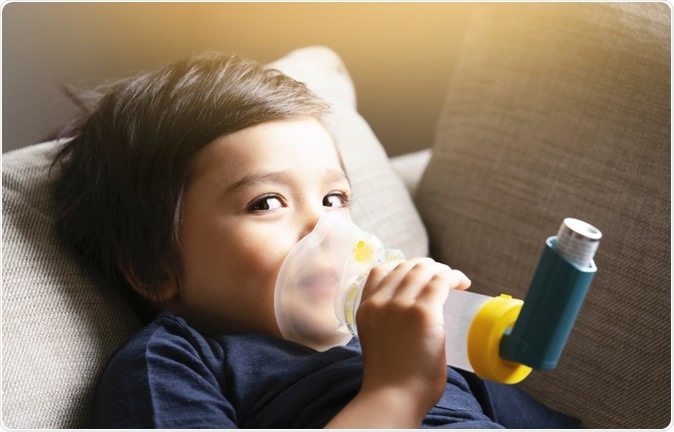We already know that children in poor neighborhoods have worse health, on average, than those in better surroundings. However, there is little research on how to minimize the negative impact of a dangerous neighborhood on a child’s health. The current study led by Edith Chen provides a useful pointer in this regards.
Environmental exposure to physical air pollutants and to allergy-inducing substances is important in inducing asthma symptoms in children who are vulnerable. However, the current study shows that there are social factors too which contribute to asthma-related health deterioration in children. Among the more prominent of these is a difficult neighborhood.

Study's findings could help pediatricians provide suggestions to families about managing their child's asthma. Image Credit: Shutterstock
However, having a loving and dependable family can help asthmatic children optimize their clinical outcomes even in poor neighborhood conditions, researchers found in the current study. The same buffering association didn’t come into play when children lived in safer and more orderly surroundings.
The study involved over 300 Chicago children between 9 and 17 years old, all of whom had already been diagnosed with asthma by a physician. Their neighborhood streets were examined using the Google app Street View. The purpose of the virtual ‘stroll’ was to look for signs that the streets were safe and quiet, or the reverse.
Graffiti, barred windows, abandoned or decrepit cars, and boarded-up homes were all evidence of a rundown and dangerous place to live. This provided a more objective indication of the level of “danger and disorder” that participants went through each day as they passed through their neighborhood areas to and from their homes.
In addition, using tools like interviews, questionnaires, spirometric lung function testing, and blood tests, researchers gathered specific information in various areas. One, they asked about the asthma outcome in each child. This related to the nature and level of symptoms, limitation of activity due to asthma, and lung volume. Secondly, they looked at the family behavior in relation to the child’s asthma: did the family routinely support the child in managing the asthma, and was there a generally positive vibe between the family and the child? Finally, they evaluated biomarkers like the number of certain immune cells and the response of these cells to glucocorticoid administration.
They found that children with predictable and safe environments tend to deal with their asthma well, with little limitation of ordinary activity and good lung function, regardless of the differences in the level of support and love they got at home. But in dangerous neighborhoods, the immune system in children with asthma appeared to be in a state of greater alertness, with the immune cells showing greater cytokine production and more resistance to inhibition by glucocorticoids.
However, with poor neighborhood quality, family relationship quality produced clear-cut effects. The higher the family scored in terms of positive relationships, the better the children did at managing their asthma. In such surroundings, when the family helped the child deal with asthma on a daily basis, all asthma-related data showed a positive trend.
Researcher Edith Chen said that this research was important because most families have to stay put even if they live in difficult neighborhoods. However, she said, “When children lived in neighborhoods that were high in danger and disorder, the better their family relationships, the fewer symptoms and activity limitations they had, and the better their pulmonary function. If pediatricians can provide suggestions to families about how supportive relationships can help with managing their child's asthma, while at the same time still acknowledging the realities of the ongoing neighborhood difficulties that many of these families face, this might help families.”
Scientists are not clear just how this works. It could be, they speculate, that children whose families provide a source of support and love are able to devote enough attention to managing their asthma symptoms with the help of their families. For instance, others in the family help them keep their routine management steady, such as taking their medications in the right way and at the right time, perhaps by protecting them from negative or disrupting factors in the neighborhood. More study will be needed to confirm the mechanisms which underlie the positive role of family and parenting in young asthmatics living in high-risk surroundings.
The study was published in the journal Pediatrics on July 18, 2019.
Journal reference:
Neighborhood Social Conditions, Family Relationships, and Childhood Asthma, Edith Chen, Robin Hayen, Van Le, Makeda K. Austin, Madeleine U. Shalowitz, Rachel E. Story, Gregory E. Miller, Pediatrics Jul 2019, e20183300; DOI: 10.1542/peds.2018-3300, https://pediatrics.aappublications.org/content/early/2019/07/16/peds.2018-3300